The ancient Indian practice of Ayurveda places great importance on the role of diet in maintaining good health and preventing disease. However, it also factors in one’s constitution or Prakriti, digestive power or agni, taste or rasa of food, heating or cooling energy of food or veerya, and post-digestive (metabolic) effect or vipaaka. By understanding these factors and tailoring one’s diet accordingly, Ayurveda believes optimal health can be achieved and diseases prevented.
Prakriti, an individual’s inherent constitution, determines health and disease susceptibility. According to Ayurveda, Prakriti comprises the three doshas – Vata, pitta, and kapha – which influence various aspects of the body and mind. Certain foods and lifestyle habits may promote optimal health and well-being depending on one’s predominant dosha, while others could have adverse effects. Understanding one’s Prakriti can help guide personalized recommendations for maintaining good health and preventing disease.
Prakriti agni, also known as digestive fire, is crucial in maintaining overall health and wellness. When the doshas in the body are balanced, so too is the power of digestion and metabolism. However, an imbalance in the doshas can negatively impact one’s digestive system and lead to various health issues. Understanding and balancing Prakriti agni is essential for promoting optimal health and preventing disease.
Agni, or the digestive power, in our body relies heavily on the balance of doshas. When there is an imbalance of these doshas, it can result in issues with digesting and metabolizing food properly. It is essential to maintain this balance to ensure a healthy digestive system.
In Ayurvedic medicine, agni is the term used for digestive power.
Vishama Agni
Vishama agni occurs when vaata dosha causes an irregular appetite and indigestion, leading to emotional imbalances such as anxiety and fear.
According to Ayurveda, Vishama agni can occur due to several factors, such as irregular food habits, excessive consumption of cold, dry or spicy food, lack of physical exercise, mental stress, and hormonal imbalances.
Symptoms of Vishama agni:
Irregular appetite, bloating, constipation, diarrhea, fatigue, weight gain or loss, and mental fog.
To treat Vishama Agni, according to Ayurveda, follow a balanced diet, regular exercise, stress management, and herbal remedies. The treatment plan may involve detoxification, dietary adjustments, herbal supplements, and lifestyle modifications.
Teekhna Agni
Teekhna agni, on the other hand, is caused by pitta dosha and can result in hyper-metabolism, heartburn, and inflammatory diseases.
According to Ayurveda, Teekshna Agni is considered a healthy digestion state. A strong appetite, regular bowel movements, good energy levels, and overall physical and mental health characterize it.
However, if Teekshna agni becomes too strong, it can lead to specific health issues such as acidity, heartburn, and inflammation in the digestive tract.
To maintain a healthy Teekshna agni, Ayurveda recommends a balanced diet that includes a variety of fresh, whole foods that are easy to digest. It also suggests avoiding foods that are heavy, oily, or difficult to digest. Other tips for maintaining a healthy Teekshna agni include eating regularly, practicing stress-reducing techniques such as yoga or meditation, and getting plenty of physical exercises.
Manda Agni
In Ayurveda, “Manda Agni” refers to a slow or weak digestive fire. According to Ayurvedic principles, a healthy digestive fire or “agni” is essential for maintaining good health and preventing disease.
Manda Agni can occur due to various factors, including poor diet, lack of exercise, stress, and other lifestyle factors. When the digestive fire is weak, food is not properly digested and metabolized, accumulating toxins in the body.
Ayurveda recommends several remedies for Manda Agni, including dietary changes, herbal remedies, and lifestyle modifications. For example, consuming warming spices such as ginger, cumin, and black pepper can help to stimulate the digestive fire, while avoiding heavy, fried, or processed foods can reduce the burden on the digestive system.
Sama Agni
Sama agni is ideal as it represents the balanced state of all three doshas, allowing for easy digestion and healthy elimination of almost any type of food.
Sama Agni is considered the ideal state of digestive fire, as it allows for optimal digestion, absorption, and assimilation of nutrients from food.
Ayurveda recommends several dietary and lifestyle practices to help maintain Sama Agni, including eating a balanced diet of fresh, whole foods; avoiding overeating or undereating; consuming meals at regular intervals; and engaging in regular physical activity.






